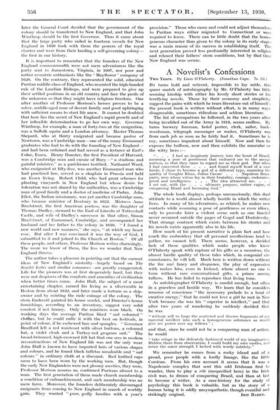A Novelist's Confessions
Two Years. By Liam O'Flaherty. (Jonathan Cape. 7s. Gd.)
By turns bold and reticent, impossible to lay aside, this queer snatch of autobiography by Mr. O'Flaherty has little seeming kinship with either his lovely short stories or his terrifying novels. Those by their economy and simplicity suggest the pains with which he tears literature out of himself the present book is written without effort, is in many ways disagreeable, sometimes ridiculous and seldom literature.
The list of occupations he followed, in the two years after being invalided out of the Army in 1918, seems endless. By turns brewery foreman, hotel porter, clerk, sailor, back- woodsman, telegraph messenger or waiter, O'Flaherty ran from each job as soon as he fairly had it. Sometimes he is coy, sometimes impudent about himself. Now and then he exposes the buffoon, now and then exhibits the muscular or the witty hero :— " . . . I had an imaginary journey into the heart of Brazil. assuming a pose of gentleness that endeared mo to the savage natives, so that they came to regard me as their god. But when I had converted them . . . and found myself head of a vest horde, I chose to become a god of a different type, assuming the quality of Genghis Khan, Julius Caesar . . . Napoleon Bona- parte, men whose virtue lay in their brutality, courage, endurance, greed and intelligence. . . The idea attracted me. . . . I set out, with the . . . ultimate purpose, rather vague, of conquering Brazil and becoming God."
The whole book displays, perhaps unconsciously, this dual attitude to a world almost wholly hostile in which the writer lives. In many of his adventures, as related, he makes'new contacts while assuming a pose of gentleness or even' idiocy, only to provoke later a violent scene such as one fancied never occurred outside the pages of Gogol and Dostoievsky. That strange contrast which exists between his stories and his novels exists apparently also in his life.
How much of his present narrative is plain fact and how much the embroidery that all personal recollections tend to gather, we cannot tell. There seems, however, a decided lack of those qualities which make people who know O'Flaherty speak with rapture of his gifts as a raconteur, the almost bardic quality of those tales which, in congenial cir- cumstances, he will tell. Much here is written down without the fire and fancy and eloquence, the play of expression with makes him, even in Ireland, where almost no one is born without rare conversational gifts, a prince among talkers. He has failed to reproduce that living tone.
As autobiographer O'Flaherty is candid enough, but often in a graceless and hostile way. We learn that he considers remorse of conscience " the necessary prelude to a bout of creative energy," that he could not love a girl he met in New York because she was his " superior in intellect," and that after two years of wandering he suddenly decided that he was " without will to forge the scattered and diverse fragments of my material intellect into such a homogeneous substance as would give me power over my fellows" ;
and that, since he could not be a conquering man of action, he would take refuge in the delicately fashioned world of my imagination. Hidden there from observation, I could build my own castles, and mime the outer strength I lacked with wordy subtlety."
We remember he comes from a rocky island and of is proud, poor people with a lordly lineage, like the little Corsican. From his own account it seems that it was a Napoleonic complex that sent this odd Irishman first to wander, then to play a ride (unspecified here) in the Irish civil war, to dream of conquering Brazil, and then at last to become a- writer. As a case-history for the study of psychology this book is valuable, but as the story of a human being it is oddly unsympathetic, though eventful and










































 Previous page
Previous page